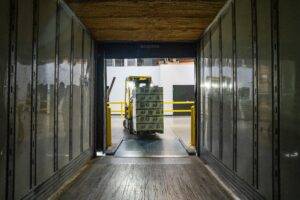Warehousing is an essential component of any successful business in today’s globalized world, which makes it one of the most important aspects of modern business. Warehouses help businesses save money and provide improved service to their customers, making storage facilities an essential component of any business. How efficiently warehouses are handled and how quickly orders can be completed has an impact on a wide variety of factors, including the cost of raw materials, the availability of stock, and the timing of the order fulfillment process.
At first, it could look like a waste of money, but in the long term, it can end up helping you save money and get more done for you. In spite of the fact that an order has been placed, the customer’s journey has yet to come to a conclusion. With the assistance of a warehouse, one can achieve improved inventory management and timely delivery to end users, which can ultimately result in increased earnings. In this blog post, we will discuss the meaning of the term “logistics warehousing” and the functions it fulfills in logistics.
An Overview of Warehousing in Logistics?
The term “warehousing” refers to an essential part of a fundamental logistic process, which includes actions in the field of supply management or the organization of inlets and outlets, or, to put it another way, inflows and outflows of goods within an organization. Warehousing is a significant component of a basic logistic process. One of the subfields that come within the broader logistics category is known as warehousing logistics. This subfield of logistics seeks to handle the issues that arise while attempting to organize a warehouse by developing a method for stocking, receiving, and accounting for goods.
The Role of Warehousing in the Logistics Process
Warehousing plays a crucial role in supply chain management, which coordinates the flow of commodities from producer to consumer. Based on logistics warehouse benefits, poor warehouse operations can halt the supply chain due to a lack of goods, delays, or obstructions. Any warehouse-based logistical work should be done so as to prevent the warehouse itself from becoming a bottleneck in the supply chain.
Warehouses’ primary function is to ensure the smooth operation of businesses by stocking enough raw materials, finished goods, and packaging to ensure continuous production. Constant shipment tracking makes it possible to ship out orders promptly and receive finished goods. It’s important to remember that warehouses facilitate marketing operations by always making available the materials needed to finish a promotion or to manufacture a promotional set.
Warehouse Function in a Supply Chain
1. Transport
Transport is the backbone of every logistics system, allowing for the flow of products from manufacturer to consumer. The product is being transferred from the seller to the buyer. In most cases, the buyer is not involved in the actual delivery of goods from the provider. They need to be shipped from the factory to the ultimate location. It is particularly crucial for businesses who carry goods across short distances to consolidate their transportation in order to save money on logistics.
2. Conduct quality checks
Any product kept in a centralized warehouse needs to have its precise dimensions, quantity, and configuration recorded so that the right item may be shipped at the right time. Verification checks, visual verification checks, and scanning a code from the product or container are all examples of conventional quality control methods. It is becoming increasingly crucial to conduct verification inspections of the product or container, which can be both time-consuming and costly.
3. Accounting for stock
With proper inventory management, you can have just the right amount of stock on hand to satisfy client demand while also minimizing your overall investment in the stuff. With this system in place, you can confidently manage your stock to satisfy client demands and not worry about the intricacies of your accounting processes, such as inventory value and valuation.
4. Product Excellence
A product is considered high quality if it consistently provides the desired results for its intended audience. When placing an order, customers often specify a variety of products and quantities for each. The majority of enterprises mass produce their goods in rented factories. By putting things in storage, we can speed up the order fulfillment process and reduce the amount of time it takes to move products through the system.
5. Provides Assistance to Clients
Logistics is responsible for providing products at specified times and locations. It’s also useful in distribution centers, where it facilitates speedier order fulfillment by making it simpler to schedule production (without running out of materials). Suppliers can’t foresee the risks of running low on inventory, while customer demand is highly unpredictable.
6. Safety from unexpected events
The production process could come to a standstill if there are interruptions in the delivery of raw materials, which is a negative development for a business. It is possible for unexpected circumstances to manifest themselves in distribution warehouses. Products that are damaged while in transit may have an effect on stock levels as well as the efficiency with which orders are fulfilled.
Functions of Warehousing in Logistics
The following are the three categories that make up the functions of warehousing in the field of logistics:
1. Execution of Warehouse Procedures & Functions
It encompasses everything that needs to be done in order to finish the warehouse projects (acceptance of goods, storage, preparation of documents, the release of supplies, registering and recording stocks, revealing losses during the warehousing process). The procedure for managing the warehouse makes it possible to accept, store, and release supplies based on the information turnover documentation, the protection of supplies, the current maintenance of supplies while taking into consideration sensitive goods, all of the records of materials, and the control of stock.
2. Warehouse Management
Planning, organizing, coordinating, and controlling are all components of warehouse management, and they are related to the following terms:
- Planning a warehouse operation and getting work done on a variety of different time scales
- Operations and processes
- Management of the warehouse’s daily operations
3. Organizational Authorizations
Location in a supply chain affects the structure, machinery, and strategy of a warehouse; it is also relevant to the issue of warehouse location and functions, such as product conditioning in a traditional warehouse next to a facility or in logistic centers, which decreases the amount of time goods are stored in a warehouse.
Wrapping Up
With the above information, it is clear that warehouse service is the most crucial component of the supply chain and logistics system. Warehouses are highly valuable to logistics since they facilitate better inventory management and reduce processing times. Smart and effective warehouse management allows logistics and supply chain companies to grow and expand significantly. Contact I-Way’s warehousing and logistics services if you are also looking for warehouse services. Whatever your company’s logistics and storage requirements are, we’re here to help. Our comprehensive solutions are tailored to meet your requirements and maximize the effectiveness of your supply chain.




